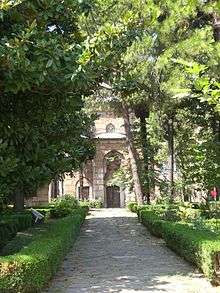Bülbül Hatun
Bülbül Hatun (Ottoman Turkish: بلبل خاتون; died c. 1515) was a consort of Sultan Bayezid II of the Ottoman Empire.
| Bülbül Hatun | |
|---|---|
 The tomb of Bülbül Hatun is located inside the Muradiye Complex, in Bursa | |
| Died | c. 1515 Bursa, Ottoman Empire (present day Bursa, Turkey) |
| Burial | |
| Spouse | Bayezid II |
| Issue | Şehzade Ahmet Şehzade Mahmud Hundi Hatun |
| Religion | Sunni Islam |
Life
Bülbül Hatun married Bayezid when he was still a prince and the governor of Amasya. She had three children, two sons, Şehzade Ahmet and Şehzade Mahmud, and one daughter, Hundi Hatun, who married Hersekzade Ahmed Pasha.[1]
According to Turkish tradition, all princes were expected to work as provincial governors as a part of their training. Ahmed was sent to Çorum in 1480, and then to Amasya, and Bülbül accompanied him.[2]
She built and endowed a mosque and a soup kitchen in Ladik. At Amasya, she built another mosque, a school and a fountain. In Bursa she had endowed and built a religious college.[3][4] She endowed a portion of her properties to the Enderun mosque in 1505.[5] After Şehzade Mahmud's death in 1507, she built a tomb for him in Bursa.[6]
In 1512, she built another complex and endowed a significant amount of property for its expenses. She designated her son Ahmed, and upon his death Ahmed's eldest daughter and her daughters, as the administrator of the endowment. Bülbül's delegation of the regency of the endowment through the matrilineal line after his son Ahmed demonstrated that this endowment was established as a precautionary measure in the event that Ahmed failed in his bid for the sultanate.[5]
In 1513, Bülbül's granddaughter, Fatma Sultan, daughter of her son, Şehzade Mahmud, and her husband Mehmed Çelebi were placed under house arrest following the Kızılbaş leanings. She was only pardoned following Bülbül's intercession.[7]
Death
After the death of Şehzade Ahmed in 1513, Bülbül Hatun came to Bursa. She built a tomb for Ahmed, in which she was too buried at her death in 1515.[3][4][8]
Issue
Together with Bayezid, Bülbül had three children:
- Şehzade Ahmet (Amasya, c. 1466 - Yenişehir, 24 April 1513) Governor of Sarihan 1481-1483 and of Amasya 1483-1513;[3][9][10][8]
- Şehzade Mahmud (Amasya, c. 1475 - Manisa, c. 1507), Governor of Kastamonu 1504 and of Sarihan 1504-1507;[11][10]
- Hundi Hatun, married in 1484, Damat Hersekzade Ahmed Pasha;[3][4][10][8]
References
- Al-Tikriti 2004, p. 315, 317.
- Al-Tikriti 2004, p. 58 n. 35, 315.
- Uluçay 1985, p. 44.
- Peirce 1993, p. 50.
- Karatas, Hasan (2011). The City as a Historical Actor: The Urbanization and Ottomanization of the Halvetiye Sufi Order by the City of Amasya in the Fifteenth and Sixteenth Centuries. p. 53.
- Yardımcı 1976, p. 48.
- Al-Tikriti 2004, p. 318 n. 105.
- Inventory 2003, p. 216.
- Peirce 1993, p. 78.
- Yakupoğlu 2010, p. 321.
- Uluçay 1985, p. 44 n. 3.
Sources
- M. Çağatay Uluçay (1985). Padişahların kadınları ve kızları. Türk Tarih Kurumu.
- Necdet Sakaoğlu (2008). Bu mülkün kadın sultanları: Vâlide sultanlar, hâtunlar, hasekiler, kadınefendiler, sultanefendiler. Oğlak Yayıncılık. ISBN 978-9-753-29623-6.
- Leslie P. Peirce (1993). The Imperial Harem: Women and Sovereignty in the Ottoman Empire. Oxford University Press. ISBN 978-0-195-08677-5.
- Narodna biblioteka "Sv. sv. Kiril i Metodiĭ. Orientalski otdel, International Centre for Minority Studies and Intercultural Relations, Research Centre for Islamic History, Art, and Culture (2003). Inventory of Ottoman Turkish documents about Waqf preserved in the Oriental Department at the St. St. Cyril and Methodius National Library: Registers. Narodna biblioteka "Sv. sv. Kiril i Metodiĭ.CS1 maint: multiple names: authors list (link)
- Yardımcı, İlhan (1976). Bursa tarihinden çizgiler ve Bursa evliyaları. Türdav Basım, Yayım.CS1 maint: ref=harv (link)
- Al-Tikriti, Nabil Sirri (2004). Şehzade Korkud (ca. 1468-1513) and the Articulation of Early 16th Century Ottoman Religious Identity – Volume 1 and 2.